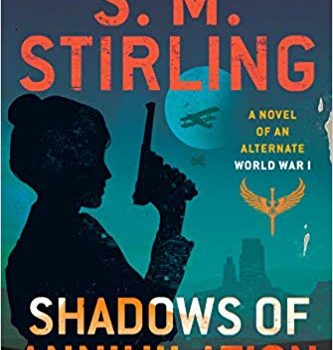Liz Bourke Reviews Shadows of Annihilation by S.M. Stirling
 Shadows of Annihilation, S.M. Stirling (Ace 978-0399586279, $18.00, 400pp, tp) March 2020.
Shadows of Annihilation, S.M. Stirling (Ace 978-0399586279, $18.00, 400pp, tp) March 2020.
S.M. Stirling’s Shadows of Annihilation is the third volume in his series of spy thrillers set in an alternate history of the early 20th century. It follows 2018’s Black Chamber and 2019’s Theater of Spies, and, like them, it stars clandestine operative Luz O’Malley Aróstegui and her lover, technical genius Ciara Whelan, as they face a threat spearheaded by agents of the (willing to deploy chemical weapons of mass destruction against civilian targets) German empire, freshly invigorated by its European victories.
Shadows of Annihilation is a more domestic novel than its predecessor: domestic in both senses, as it is set entirely within the confines of the American empire and as it spends more time exploring Luz and Ciara’s relationship – and their joint relationship with their jobs – while they’re not under quite such pressing threats of imminent capture, torture, and death. This doesn’t result in any diminution of narrative tension: the portrayal of their domesticity is counterpointed with the knowledge – both theirs and the reader’s – that one of their enemies has an extremely personal grudge against them. In seeing more of their relationship we see more of what’s at stake in intimate, personal terms. It works: Stirling writes a compelling, well-paced thriller with satisfying emotional stakes.
The setting of the novel, though – in American-occupied Mexico, a Mexico that is being forcibly integrated into the American imperial project with a well-judged combination of carrots and sticks – gives us a starting point to interrogate the novel’s, and the series as a whole’s, portrayals of empire and the characters’ relationship to the world.
For Stirling (or for the authorial voice of the series, which may or may not wholly reflect Stirling’s own views), empire and its atrocities are inevitable. Much like hurricanes and earthquakes, they are a natural force arising from the human tendency to form and prioritise groups. As natural forces, empires lack intentionality and thus culpability: they are amoral not in the sense that they lack morals (though they do) but in the sense that they exist outside of human-scale moral frameworks and thus cannot be judged by them. (The argument on imperial morality goes all the way back to the Athenian view in Thucydides’ representation of the Melian dialogue: “You know as well as we do that right, as the world goes, is only in question between equals in power: the strong do what they can and the weak suffer what they must,” [Thuc. V, 5.89-[1]] a view which has been argued ever since.) Empires, in the view of the narrative, have no moral weight. They simply are, and so too with them, as a simple natural consequence, comes genocide, forced assimilation, cultural erasure, the destruction of memory….
But the inevitability of empire looks different to an agent of empire than to a subject. Inasmuch, at least, as one can make a clear distinction between the body that enacts the dictates (spoken or unspoken) of empire and the body that those dictates are enacted upon. (Sometimes subject and agent exist in the same body. Sometimes assimilation and allegiance is partial, conflicted, torn.)
Let us look to the American imperial project as portrayed in Stirling’s novels. Given the inevitability of empire, some empires must (mustn’t they?) be better than others. The American imperial project portrayed here is self-interested in its benevolence: it allows its subjects to assimilate into and thus access its systems of power. But allegiance is never permitted to be primarily local and transactional, nor does it not acknowledge a real cost or loss (personal or cultural) to assimilation. Assimilation is viewed as beneficial – and the narrative and its worldbuilding do not reckon with or examine the position of white supremacy or Christian religion in American society, and how that can impose impassable barriers to assimilation even from subjects who desire it wholeheartedly.
I’ve spent a lot of time thinking about empire and assimilation, allegiance and participation. To live with the legacy of colonisation is to live with a kind of double vision between complicity and loss, allegiance and resistance: to engage with the American hegemony in Anglophone pop culture as a non-American is to see that vision tripled, to be constantly aware of your immersion in a set of values, of ways of seeing, that do not erase other values and ways of seeing so much as drown them out through sheer ubiquity; to render them less visible through volume, rather than active malice. To participate is to be constantly involved in a kind of negotiation, always partially alienated everywhere, always partially immersed, always aware that one’s belonging – one’s authority within the cultural frame – is contingent on performing. Whether that performance is one of assimilation or “authenticity,” or some exactly correct but ultimately arbitrary balance between the two, depends on the context and the day. (Authenticity, too, is a construct of imperial ways of seeing.)
So it is interesting (fascinating, the product of a very particular way of seeing) that Shadows of Annihilation‘s protagonists – Luz, a brown-skinned woman of Cuban and Irish extraction, and Ciara, the child of Irish immigrants to Boston with a personal connection to the Irish Republican Brotherhood, who both share a subaltern identity in their attraction to other women – never experience conditionality either in their interactions with empire or in their assimilation into the imperial project. For Luz and Ciara, their belonging to the American imperial project is never seen as conditional on the correct performance of a way of being in relation to empire. Their allegiance to it, once given, is never questioned. That allegiance isn’t fraught, or complicated by other loyalties: it’s never negotiated or partial. They may have personal loyalties, cultural touchstones, but those loyalties do not exert any counterweight against their complete assimilation to the American imperial project. Rather, they support it.
The violence of the empire which Luz and Ciara serve is never directed against them, their families, or their communities. They do not notice their personal participation in empire as something that has a cost – in culture, language, or memory; in community or history or continuity. For them, the American imperial project is not productive of personal grief or internal conflict: it does not involve personal compromises and reckoning with conflicted cultural loyalties. Shadows of Annihilation is a novel about secret (and double) agents, but it lacks the double vision that so many of us learn simply as a consequence of existing, and that makes its characters so much shallower than they could be.
Luz and Ciara could be interesting lenses through which Stirling might interrogate the costs of the American imperial project, and the compromises its agent-subjects make. But ultimately Shadows of Annihilation fails to see (or deliberately ignores) the more interesting perspectives on empire afforded by the tensions of its internal power, as opposed to the narrative’s apparent conviction that imperial power is both stable – rather than a dynamic balance of competing forces – and inevitable.
As a thriller, mind you, it’s still a decent book.
Liz Bourke is a cranky queer person who reads books. She holds a Ph.D in Classics from Trinity College, Dublin. Her first book, Sleeping With Monsters, a collection of reviews and criticism, is out now from Aqueduct Press. Find her at her blog, her Patreon, or Twitter. She supports the work of the Irish Refugee Council and the Abortion Rights Campaign.
This review and more like it in the March 2020 issue of Locus.
 While you are here, please take a moment to support Locus with a one-time or recurring donation. We rely on reader donations to keep the magazine and site going, and would like to keep the site paywall free, but WE NEED YOUR FINANCIAL SUPPORT to continue quality coverage of the science fiction and fantasy field.
While you are here, please take a moment to support Locus with a one-time or recurring donation. We rely on reader donations to keep the magazine and site going, and would like to keep the site paywall free, but WE NEED YOUR FINANCIAL SUPPORT to continue quality coverage of the science fiction and fantasy field.








